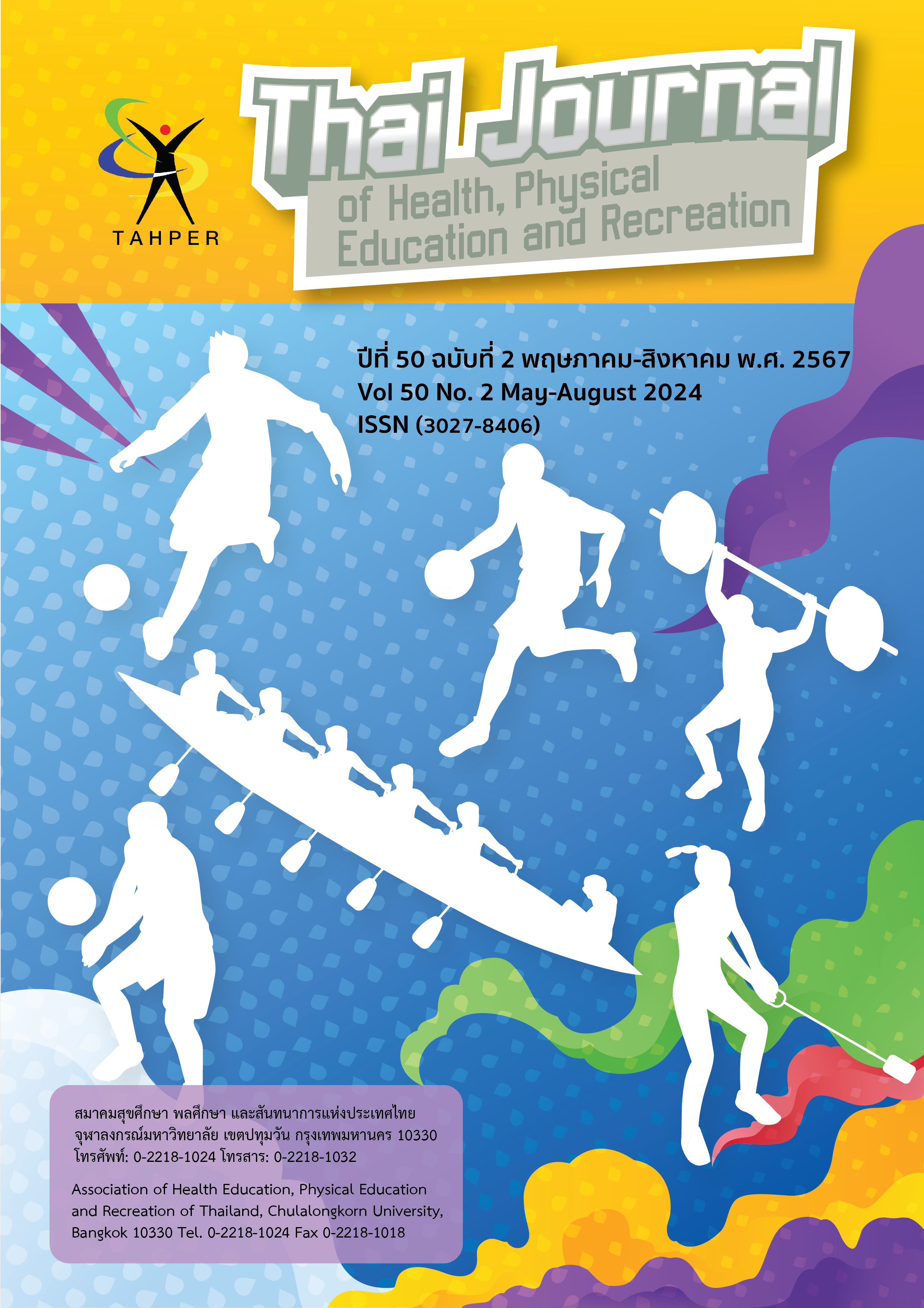Competencies of Physical Education Teachers and Learning Management in the 21st Century
Main Article Content
Abstract
The rapidly changing context of the current global society, driven by advances in science and technology, has led to a transformation in the way human life is conducted. Thailand must turn back to reflect on and reconsider its educational reforms in order to ensure the quality of developing learners to possess knowledge, abilities, skills, and essential qualities necessary to confront the uncertainties and changes of the 21st century.
The management of physical education aims to develop learners holistically across five dimensions. The design of physical education learning activities should be adaptable and integrated to foster learner development in the 21st century. Physical education teachers must possess a body of knowledge to analyze and design learning management that aligns with goals. This includes continuous improvement and innovation in their own teaching methods to be responsive to current learning skills. Physical education teachers need competencies in managing physical education learning to enhance learner development in the 21st century, promoting effectiveness, efficiency, and sustainability. The results of the analysis and synthesis of the current problems in physical education learning management found that the essential competencies for educational administrators in managing learning in the 21st century consist of 7 competencies: 1) Self-development and professionalism 2) Student development and learning management 3) Communication and fostering good interpersonal relationships 4) Ethical values 5) Use of media and digital technology 6) Adaptability to change and 7) Innovation and research.
Article Details

This work is licensed under a Creative Commons Attribution-NonCommercial-NoDerivatives 4.0 International License.
Critical thinking in journals is the right of the author. The Association of Health Education, Physical Education and Recreation of Thailand is not always required, to create diversity in ideas and creativity.
ความคิด ข้อวิพากษ์ในวารสารเป้นสิทธิของผู้เขียน สมาคมสุขศึกษา พลศึกษา และสันทนาการแห่งประเทศไทยไม่จำเป็นต้องเห็นชอบด้วยเสมอไป เพื่อให้เกิดความหลากหลายในความคิดและความสร้างสรรค์
References
ฉัตรชัย สูตรสุคนธ์. (2563). สมรรถนะที่พึงประสงค์ของครูผู้สอนกลุ่มสาระการเรียนรู้สุขศึกษาและพลศึกษาในศตวรรษที่ 21 ในกลุ่มเรียนโรงเรียนสวนกุหลายวิทยาลัย. วิทยานิพนธ์ศึกษาศาสตรบัณฑิต สาขาวิชาพลศึกษา, มหาวิทยาลัยการกีฬาแห่งชาติ วิทยาเขตชลบุรี.
ธงชาติ พู่เจริญ. (2559). การพัฒนากลยุทธ์การผลิตครูพลศึกษาในศตวรรษที่ 21. ดุษฎีนิพนธ์การศึกษาดุษฎีบัณฑิต สาขาวิชาสุขศึกษาและพลศึกษา, มหาวิทยาลัยศรีนครินทรวิโรฒ.
พงษ์เอก สุขใส. (2561). ครูพลในศตวรรษที่ 21. วารสารวิชาการมหาวิทยาลัยฟาร์อีสเทิร์น, 12, 8-2.
ไพฑูรย์ สินลารัตน์ และนักรบ หมี้แสน. (2560). ความเป็นครูและการพัฒนาครูมืออาชีพ. กรุงเทพฯ: สำนักพิมพ์แห่งจุฬาลงกรณ์มหาวิทยาลัย.
วราพร ดำจับ. (2561). การสื่อสารในยุคดิจิทัล. วารสารสหศาสตร์ศรีปทุม ชลบุรี, 3(1), 46-50.
ศิริวรรณ ฉัตรมณีรุ่งเจริญ และวรางคณา ทองนพคุณ. (2557). ทักษะแห่งศตวรรษที่ 21 ความท้าทายในอนาคต 21st Century Skills: The Challenges Ahead. ภูเก็ต: คณะครุศาสตร์ มหาวิทยาลัยราชภัฏภูเก็ต.
ุรวีร์ เพียรเพชรเลิศ. (2553). การพัฒนารูปแบบการบริหารจัดการและการจัดการประสบการณ์ วิชาชีพครูในสถาบันอุดมศึกษาของไทย. วิทยานิพนธ์การศึกษาดุษฎีบัณฑิต สาขาวิชาหลักสูตรการสอน, มหาวิทยาลัยเกษตรศาสตร์.
เสาวลักษณ์ ประมาณ, ต่อศักดิ์ แก้วจรัสวิไล และธีรนันท์ ตันพานิชย์. (2561). สมรรถนะครูพลศึกษา. วารสารศิลปศาสตร์และวิทยาการจัดการ, 9(1), 153-180.
อัสรี สะอีดี, จินตนา สรายุทธพิทักษ์ และรัชนี ขวัญบุญจัน. (2561). การประเมินความต้องการจำเป็นเพื่อเสริมสร้างสมรรถนะครูพลศึกษาในศตวรรษที่ 21 ของครูพลศึกษาในโรงเรียนมัธยมศึกษา. วารสารวิชาการ มหาวิทยาลัยการกีฬาแห่งชาติ, 13(1), 259-268.


